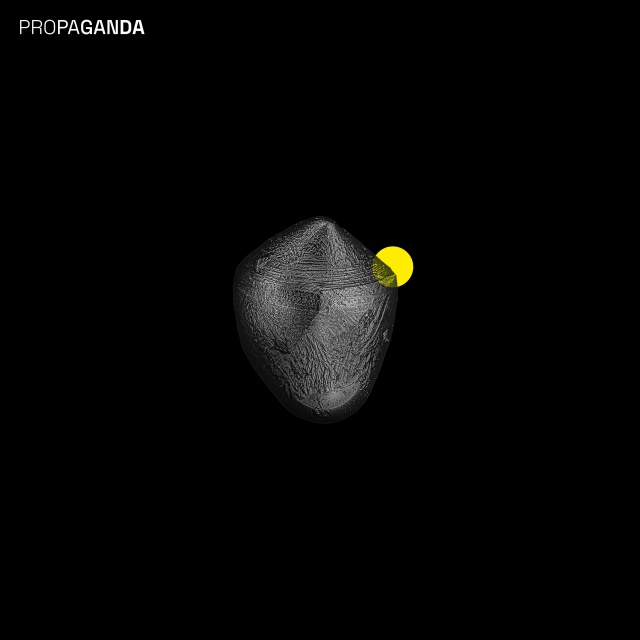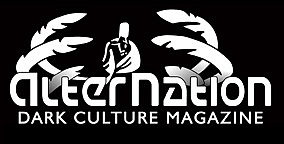Propaganda – “Propaganda”

Reads: 1164 times
85%
Forty years after their groundbreaking debut, Propaganda returns with "Propaganda", an album that both echoes the band’s pioneering past and charts bold new territory. This self-titled release is a striking synthesis of their dark, art-synth roots, crafted by founding members Ralf Dörper and Michael Mertens. The album draws on the drama and intensity that characterized their early work while embracing fresh, contemporary sounds. Conceived and recorded in their native Düsseldorf, Propaganda stands as a testament to the band’s enduring relevance and creativity, enriched by contributions from guest artists such as the acclaimed Hauschka and the rising star, Thunder Bae.
The album opens with "They Call Me Nocebo," a track that instantly sets the tone with its alluring, tense atmosphere. A love song imbued with danger, it pulls listeners into a world that feels both familiar and unsettling. Its intricate electronic rhythms and dark undertones evoke the mood of classic Propaganda, while simultaneously embracing modern production techniques that give the song a sharp, contemporary edge. Thunder Bae’s evocative vocals come to the forefront in "Purveyor of Pleasure," a sensual, hypnotic piece that seamlessly blends throbbing synths with lush, atmospheric soundscapes. The song feels at once urgent and elegant, with layers of electronic texture supporting Bae's mesmerizing vocal performance.
"Tipping Point" is a high-energy, pulsating track that carries a strong rhythmic drive, marked by infectious arpeggiators and retro-inspired beats. It brims with club potential yet maintains an air of refinement and subtlety. This contrast between dancefloor vigor and sonic sophistication defines much of the album, particularly in tracks like the haunting "Distant." Here, melancholic melodies weave through spacious electronic arrangements, capturing the poignant isolation many experienced during the pandemic—a reflection on both personal and collective solitude.
"Love:Craft," inspired by the dark and eerie themes of H.P. Lovecraft, plunges the listener into a mysterious sonic realm, full of tension and unresolved harmonies. It is followed by the darkly enchanting "Dystopian Waltz," which stands as one of the album's most dramatic moments. A neo-classical instrumental, it showcases Mertens’ flair for cinematic composition, with sweeping melodies that build into an overwhelming, almost operatic crescendo. The piece is a masterful exploration of sound, reminiscent of a film score, yet fully integrated into the album’s thematic fabric.
One of the album's most intriguing moments comes with "Wenn Ich Mir Was Wuenschen Duerfte," a cover of a 1930s German classic, popularized by Marlene Dietrich. This haunting interpretation, featuring a delicate prepared piano arrangement by Hauschka, reflects the band’s willingness to explore new emotional and sonic depths. The song’s exploration of sorrow as a form of strength resonates deeply, particularly as it closes the album, leaving a lingering sense of introspection and beauty.
Throughout "Propaganda", there is a sense of balance between light and shadow, pleasure and danger, modernity and tradition. The album is a sophisticated blend of sonic textures, where every note and phrase feels meticulously crafted. The band seamlessly navigates between the bombastic and the introspective, creating a rich tapestry of sound that draws the listener into its emotional and intellectual complexities.
This record is not merely a collection of songs but a cohesive artistic statement. It demands to be experienced in its entirety, with each track contributing to an overarching narrative of sensuality, reflection, and transformation. The seamless transitions between intense club tracks and more contemplative pieces speak to the band’s ability to fuse the physical and the philosophical, making Propaganda not just an auditory experience but an intellectual and emotional one as well.
By embracing their past while boldly stepping into the future, Propaganda has created an album that is both timeless and utterly of the moment. Propaganda is a triumph of artistry and vision, a work that cements their legacy as one of the most innovative acts in electronic music.
The album opens with "They Call Me Nocebo," a track that instantly sets the tone with its alluring, tense atmosphere. A love song imbued with danger, it pulls listeners into a world that feels both familiar and unsettling. Its intricate electronic rhythms and dark undertones evoke the mood of classic Propaganda, while simultaneously embracing modern production techniques that give the song a sharp, contemporary edge. Thunder Bae’s evocative vocals come to the forefront in "Purveyor of Pleasure," a sensual, hypnotic piece that seamlessly blends throbbing synths with lush, atmospheric soundscapes. The song feels at once urgent and elegant, with layers of electronic texture supporting Bae's mesmerizing vocal performance.
"Tipping Point" is a high-energy, pulsating track that carries a strong rhythmic drive, marked by infectious arpeggiators and retro-inspired beats. It brims with club potential yet maintains an air of refinement and subtlety. This contrast between dancefloor vigor and sonic sophistication defines much of the album, particularly in tracks like the haunting "Distant." Here, melancholic melodies weave through spacious electronic arrangements, capturing the poignant isolation many experienced during the pandemic—a reflection on both personal and collective solitude.
"Love:Craft," inspired by the dark and eerie themes of H.P. Lovecraft, plunges the listener into a mysterious sonic realm, full of tension and unresolved harmonies. It is followed by the darkly enchanting "Dystopian Waltz," which stands as one of the album's most dramatic moments. A neo-classical instrumental, it showcases Mertens’ flair for cinematic composition, with sweeping melodies that build into an overwhelming, almost operatic crescendo. The piece is a masterful exploration of sound, reminiscent of a film score, yet fully integrated into the album’s thematic fabric.
One of the album's most intriguing moments comes with "Wenn Ich Mir Was Wuenschen Duerfte," a cover of a 1930s German classic, popularized by Marlene Dietrich. This haunting interpretation, featuring a delicate prepared piano arrangement by Hauschka, reflects the band’s willingness to explore new emotional and sonic depths. The song’s exploration of sorrow as a form of strength resonates deeply, particularly as it closes the album, leaving a lingering sense of introspection and beauty.
Throughout "Propaganda", there is a sense of balance between light and shadow, pleasure and danger, modernity and tradition. The album is a sophisticated blend of sonic textures, where every note and phrase feels meticulously crafted. The band seamlessly navigates between the bombastic and the introspective, creating a rich tapestry of sound that draws the listener into its emotional and intellectual complexities.
This record is not merely a collection of songs but a cohesive artistic statement. It demands to be experienced in its entirety, with each track contributing to an overarching narrative of sensuality, reflection, and transformation. The seamless transitions between intense club tracks and more contemplative pieces speak to the band’s ability to fuse the physical and the philosophical, making Propaganda not just an auditory experience but an intellectual and emotional one as well.
By embracing their past while boldly stepping into the future, Propaganda has created an album that is both timeless and utterly of the moment. Propaganda is a triumph of artistry and vision, a work that cements their legacy as one of the most innovative acts in electronic music.
https://www.bureau-b.com/
https://www.facebook.com/propagandamabuse
Release date: 11.10.2024
Label: Bureau B
Tracklisting:
A Side:
1. They Call Me Nocebo
2. Purveyor Of Pleasure
3. Vicious Circle
4. Tipping Point
B Side:
1. Distant
2. Love:Craft
3. Dystopian Waltz
4. Wenn Ich Mir Was Wuenschen Duerfte
Limited 2-LP/2-CD Edition:
1. Not Good For You
2. Solace In Sin
3. World Out Of Joint
4. I Feel Mysterious
5. The Calling
Propaganda's self-titled return captures the essence of their early years while pushing their sound into exciting new realms, delivering an album that is immersive, powerful, and emotionally resonant—a masterclass in electronic music's ability to evoke and transform.
